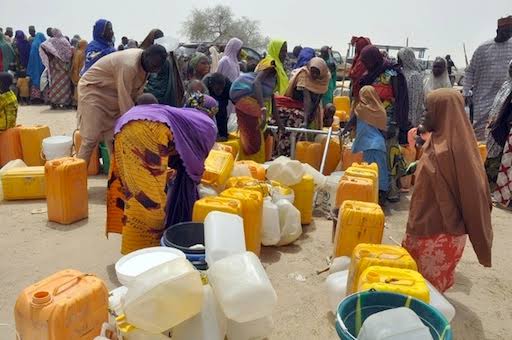EDITORIAL: Let’s talk about water scarcity in Kano
‘‘Water is life. Water has no enemy.”
However, this is not the case in Kano as many residents in rural areas, and even urban centres continue to experience water scarcity. Though every successive government has on several occasions promised to address this menace, nothing appears to have changed.
While SolaceBase understands that Kano State Water Board is incapacitated by obsolete equipment and resources as well as a negative attitude by the populace to function effectively, it is surprising that the government claim to be spending approximately N1.2 billion monthly to provide potable water in Kano metropolis.
The state’s Commissioner for Water Resources, Ali Makoda, made the revelation while speaking with journalists in Kano last Wednesday, explaining that the cost includes monthly expenditure of N400 million for diesel, N387 million for chemicals, and N280 million for electricity bills, alongside other additional costs.
READ ALSO: CSO decries acute water shortage in Kano, demands declaration of state of emergency

“There are also other costs. We are fixing the prevailing water scarcity in the state capital and its environs. In a couple of days, the problem will be over,” Makoda said.
The commissioner attributed the water shortage in the state to outdated equipment, particularly at the Tamburawa Water Treatment Plant, which serves as the primary source of water for most parts of Kano metropolis.
“The high temperature in the metropolis is also a factor as people consume higher volumes of water to cope with the weather,” he added.
The question that disturbs many residents of the state is how the government continues to spend N1.2 billion monthly for water services that’s not available. The problem affects residents in the eight metropolitan local governments – Dala, Fagge, Gwale, Kano Municipal, Kumbotso, Tarauni, Nasarawa and Ungogo.
The situation further worsened when the National Grid’s system collapsed some weeks ago, which the water board and other water sources rely on for electricity supply to provide the water. Though the system has been fixed, water scarcity still persists due to the epileptic power supply.
A Civil Society Organisation, CSO, Fiscal Discipline and Development Advocacy Centre (FIDAC) had urged the Kano Government to declare a state of emergency on water supply in the state and authorise immediate withdrawal from Contingency Fund Account to ameliorate acute water shortage in the state.
READ ALSO: Court awards N10m fine on EFCC, Fidelity bank over rights violation
“Since Goron Dutse water distribution centre stopped getting water in its reservoirs, it has been a major challenge that has led to water scarcity in Kano metropolis because companies are consuming much of the water than the citizens. The water board is generating much revenue from these companies than it gets from the citizens. When I was in service for over 40 years, there was water in Kano for the population which was low compared to the recent rapid growth of population in Kano.
“Currently, the population has increased by more than 70 per cent, more companies are now operating which consume more water than was the case” and so most homes cannot be reached. I don’t know whether the water board management understands this scenario that leads to scarcity of water, because I believe if they build more water treatment plants, I think water should be planted to meet demands,” an ex-worker of Kano water board said.
Another former employee said: “The issue of water scarcity in Kano is a challenging one because most of the pumping machines and pipes have been operating for over 30 years.”
He said such equipment had either been damaged or become rusty and repairs carried out on them were no longer sustainable.
Sani Imran, a resident of Karkasara, said the absence of public water supply had resulted in enormous hardship for people.
“For the first time in over 40 years, public water supply has been shut down, public taps have dried up, and people have to travel hundreds of kilometres searching for water. Sometimes women and children have to wake up as early as 2:00 a.m. for water.
“Most people rely on public water supply, while others rely on local wells for their water supply, ” he said. “Sometimes, people have to travel as far as Yen Lemo to fetch water in boreholes owned by wealthy individuals; it is really a pathetic situation.”
Haruna Ahmad, a resident of Darmanawa Quarters, corroborated the claim, saying his neighbour’s 15-year-old daughter was raped while trying to fetch water from a borehole at night.
Read Also: 2023: Abba Gida-Gida visits Emir of Kano, pledges to end persistent water scarcity
“What happened was that there was no electricity throughout the day, and when it came in the night, she went with her sister to fetch the water, and unfortunately, she fell into the wrong hands. We have reported the case at the police station, and some arrests have been made.
It’s really a sad situation; the government must live up to its responsibility by restoring the water supply,” Ahmad said.
To address this challenge, all arms of government in the state must liaise with the Federal Ministry of Water Resources to ensure the rehabilitation of faulty pump wells and boreholes and where necessary construction new ones.



Comments are closed.